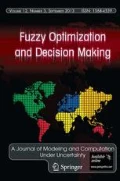Abstract
In this paper, we propose a new kernel-based fuzzy clustering algorithm which tries to find the best clustering results using optimal parameters of each kernel in each cluster. It is known that data with nonlinear relationships can be separated using one of the kernel-based fuzzy clustering methods. Two common fuzzy clustering approaches are: clustering with a single kernel and clustering with multiple kernels. While clustering with a single kernel doesn’t work well with “multiple-density” clusters, multiple kernel-based fuzzy clustering tries to find an optimal linear weighted combination of kernels with initial fixed (not necessarily the best) parameters. Our algorithm is an extension of the single kernel-based fuzzy c-means and the multiple kernel-based fuzzy clustering algorithms. In this algorithm, there is no need to give “good” parameters of each kernel and no need to give an initial “good” number of kernels. Every cluster will be characterized by a Gaussian kernel with optimal parameters. In order to show its effective clustering performance, we have compared it to other similar clustering algorithms using different databases and different clustering validity measures.











Similar content being viewed by others
References
Babuska, R., van der Veen, P. J., Kaymak, U. (2002). Improved covariance estimation for Gustafson–Kessel clustering. In IEEE International Conference on Fuzzy Systems (pp. 1081–1085).
Baili, N., & Frigui, H. (2011). Fuzzy clustering with multiple kernels. In IEEE International Conference on Fuzzy Systems (pp. 490–496).
Baili, N., & Frigui, H. (2012). Fuzzy clustering with multiple kernels in feature space. In IEEE International Conference on Fuzzy Systems (pp. 1–8).
Balasko, B., Abonyi, J., & Feil, B. Fuzzy clustering and data analysis toolbox. http://www.fmt.vein.hu/softcomp/fclusttoolbox/.
Bensaid, A. M., Hall, L. O., Bezdek, J. C., Clarke, L. P., Silbiger, M. L., Arrington, J. A., et al. (1996). Validity-guided (Re)Clustering with applications to image segmentation. IEEE Transactions on Fuzzy Systems, 4, 112–123.
Bezdek, J. C. (1981). Pattern recognition with fuzzy objective function algorithms. Berlin: plenum press.
Dunn, J. C. (1973). A fuzzy relative of the ISODATA process and its use in detecting compact well-separated clusters. Journal of Cybernetics, 3, 32–57.
Eschrich, S., Ke, J., Hall, L., & Goldgof, D. (2003). Fast accurate fuzzy clustering through data reduction. IEEE Transactions on Fuzzy Systems, 11(2), 262–270.
Evaluation of clustering. http://nlp.stanford.edu/IRbook/html/htmledition/evaluation-of-clustering-1.html.
Gath, I., & Geva, A. B. (1989). Unsupervised optimal fuzzy clustering. IEEE Transactions on Pattern Analysis and Machine Intelligence, 7, 773–781.
Gustafson, D. E., & Kessel, W. C. (1979). Fuzzy clustering with fuzzy covariance matrix. In Proceedings of the IEEE CDC, San Diego (pp. 761–766).
Hoppner, F., Klawonn, R., Kruse, R., & Runkler, T. (1999). Fuzzy cluster analysis. Chichester: Wiley.
Kanungo, T., Mount, D. M., Netanyahu, N. S., Piatko, C., Silverman, R., & Wu, A. Y. (2002). An Efficient k-means clustering algorithm: Analysis and implementation. IEEE Transactions on Pattern Analysis and Machine Intelligence, 24(7), 881–892.
Likas, A., Vlassis, N., & Verbeek, J. J. (2003). The global k-means clustering algorithm. Pattern Recognition, 36, 451–461.
Pelleg, D., & Moore, A. (2000). X-means: Extending k-means with efficient estimation of the number of clusters. In Proceedings of the Seventeenth International Conference on Machine Learning, Palo Alto, CA.
Pelleg, D., & Moore, A.: Accelerating exact k-means algorithms with geometric reasoning.(Technical Report CMU-CS-00105), Carnegie Mellon University, Pittsburgh, PA.
Schölkopf, B., & Smola, A. J. (2002). Learning with Kernels. Cambridge, MA: MIT Press.
UCI Machine Learning Repository. http://archive.ics.uci.edu/ml/.
Vasant, P. M. (2013). Handbook of research on novel soft computing intelligent algorithms: Theory and practical applications. Hershey: IGI Global.
Vasant, P. M. (2014). Handbook of research on artificial intelligence techniques and algorithms. Hershey: IGI Global.
Vasant, P. M., Weber, G.-W., & Dieu, V. N. (2015). Classical and hybrid optimization approaches and their applications in engineering and economics. Mathematicals Problems in Engineering, Hindawi, Vol. (2015).
Xie, X. L., & Beni, G. A. (1991). Validity measure for fuzzy clustering. EEE Transactions on Pattern Analysis and Machine Intelligence, 3(8), 841–846.
Xie, W. X., Wu, Z. D., & Yu, J. P. (2003) Fuzzy c-means clustering algorithm based on kernel method. Computational Intelligence and Multimedia Applications.
Zhou, J., Cao, L., & Yang, N. (2013). On the convergence of some possibilistic clustering algorithms. Fuzzy Optimization and Decision Making, 12, 415–432.
Author information
Authors and Affiliations
Corresponding author
Rights and permissions
About this article
Cite this article
Dagher, I. Fuzzy clustering using multiple Gaussian kernels with optimized-parameters. Fuzzy Optim Decis Making 17, 159–176 (2018). https://doi.org/10.1007/s10700-017-9268-x
Published:
Issue Date:
DOI: https://doi.org/10.1007/s10700-017-9268-x




